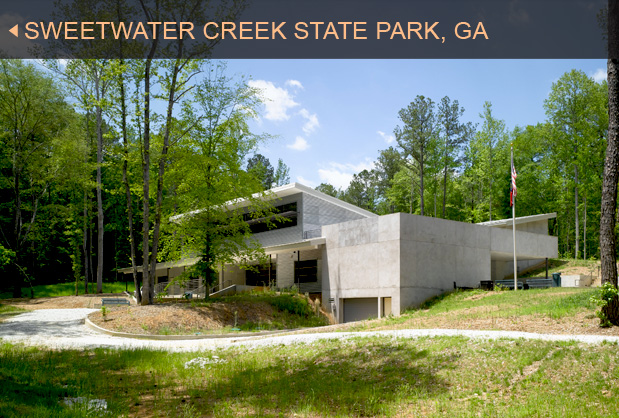FEATURED PARKS AND
RECREATION PROJECTS
RECREATION PROJECTS
Architect: Gerding Collaborative, Atlanta, GA | Engineer: Long Engineering, Atlanta, GA
Parks and Recreation Toilet Systems, Parks and Rec Toilet Systems, Sweetwater Creek State Park, Clivus Multrum Inc.
Sweetwater Creek State Park
Visitors’ Center
Lithia Springs , GA
Peaceful Wilderness
Sweetwater Creek State Park is a conservation park offering more than 2,500 acres dedicated to preservation and protection of natural and cultural resources, located just minutes from Atlanta, GA. The park is home to nine miles of hiking trails, a 215-acre lake, the historic ruins of an antebellum textile mill and now a visitors’ center with administrative offices, museum, water quality lab and classroom.
Overcoming Obstacles
The Georgia Department of Natural Resources (DNR) and Georgia State Parks are not new to green building design. The GA DNR has more green buildings than any other state, which means that they are familiar with the integrated design process required to minimize the building’s impact on the land. One challenge the group faced was a two-inch water main that led to the building. After investigating costs associated with replacing the water main, the architect, Dan Gerding contacted Clivus Multrum, which resulted in a composting toilet system that worked with the existing water main. The National ACEC Engineering Excellence Award was given to Long Engineering, Inc. for their work on the visitors’ center.
Conserve & Protect
A 77% reduction of potable water use was achieved by use of a composting toilet system and rainwater harvesting. Four of Clivus Multrum’s largest composters combined with six waterless toilets, a waterless urinal and one Foam-flush toilet serve all the toilet needs for the building. The system allowed the visitor center to forgo a septic system and save about 82,000 gallons of potable water each year. The building is tucked into the hillside to insulate and reduce visual and physical impact. Windows are oriented to allow passive solar heating in winter while minimizing solar heat in the warmer months. Solar panels, a green roof and advanced day-lighting technologies contributed to the first LEED platinum certification in the Southeast.- Four M35 composting systems accommodate 65,000 uses each per year
- One Foam-flush toilet in the "family" restroom uses just six oz. of water per use
- Six waterless toilets and one waterless urinal completely eliminate water use


